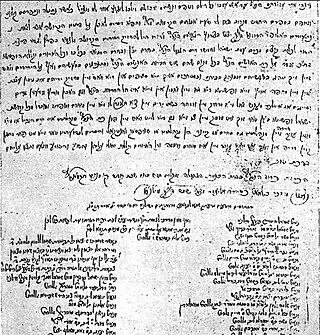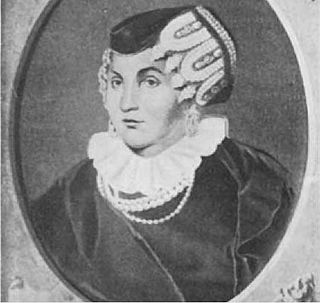Related Research Articles

Hasidism, sometimes spelled Chassidism, and also known as Hasidic Judaism, is a Jewish religious group that arose as a spiritual revival movement in the territory of contemporary Western Ukraine during the 18th century, and spread rapidly throughout Eastern Europe. Today, most affiliates reside in Israel and the United States.

Misnagdim was a religious movement among the Jews of Eastern Europe which resisted the rise of Hasidism in the 18th and 19th centuries. The Misnagdim were particularly concentrated in Lithuania, where Vilnius served as the bastion of the movement, but anti-Hasidic activity was undertaken by the establishment in many locales. The most severe clashes between the factions took place in the latter third of the 18th century; the failure to contain Hasidism led the Misnagdim to develop distinct religious philosophies and communal institutions, which were not merely a perpetuation of the old status quo but often innovative. The most notable results of these efforts, pioneered by Chaim of Volozhin and continued by his disciples, were the modern, independent yeshiva and the Musar movement. Since the late 19th century, tensions with the Hasidim largely subsided, and the heirs of Misnagdim adopted the epithet Litvishe or Litvaks.
The 18th century for the Jews of Poland was a tumultuous period as political unrest in the Polish–Lithuanian Commonwealth led to changes in the treatment and behavior of Jews living within its territory. The ascent of the Wettin dynasty to the Polish throne, as well as the government's difficulties in procuring taxes led to a waning of previous policies of religious tolerance in Poland, and the partitions of Poland during the second half of the century led to widespread violence as the government's power faltered and various regional powers and separatist movements fought for control of the territory.

Simcha Bunim Bonhardt of Peshischa also known as the Rebbe Reb Bunim was the second Grand Rabbi of Peshischa as well as one of the key leaders of Hasidic Judaism in Poland. The main disciple of Yaakov Yitzchak Rabinowicz, from 1813 to 1827, he led the Peshischa movement of Hasidic thought, in which he revolutionized 19th-century Hasidic philosophy by juxtaposing the rationalistic pietism of German-Jewry with the spiritual nature of God defined by the Hasidic movement.
Hasidic philosophy or Hasidism, alternatively transliterated as Hasidut or Chassidus, consists of the teachings of the Hasidic movement, which are the teachings of the Hasidic rebbes, often in the form of commentary on the Torah and Kabbalah. Hasidism deals with a range of spiritual concepts such as God, the soul, and the Torah, dealing with esoteric matters but often making them understandable, applicable and finding practical expressions.

Yohanan Petrovsky-Shtern is an American historian, philologist and essayist, noted in particular for his studies of the institution of Cantonism, his critique of Aleksandr Solzhenitsyn's controversial two volume-work about Jews in Russia, Two Hundred Years Together, as well as translations of Jorge Luis Borges' works into Russian. He is the Crown Family Professor of Jewish Studies and a Professor of Jewish History in History Department at Northwestern University where he teaches Early Modern, Modern and East European Jewish history.
Joanna Beata Michlic is a Polish social and cultural historian specializing in Polish-Jewish history and the Holocaust in Poland. An honorary senior research associate at the Centre for Collective Violence, Holocaust and Genocide Studies at University College London (UCL), she focuses in particular on the collective memory of traumatic events, particularly as it relates to gender and childhood.

Józef Różański was an officer in the Soviet NKVD Secret Police and later, a Colonel in the Polish Ministry of Public Security (UB), a communist secret police. Born into a Polish-Jewish family in Warsaw, Różański became very active in the Communist Party of Poland before World War II. He joined the NKVD following the Soviet invasion of Poland and after the war, adopting the name Różański, served as an agent with the Polish Communist Security apparatus.
Yaakov Yitzchak Rabinowicz of Peshischa also known as the Yid Hakudosh or the Yehudi was the founder and first Grand Rabbi of the Peshischa movement of Hasidic philosophy, and an important figure of Polish Hasidism. The leading disciple of Yaakov Yitzchak of Lublin, the Yehudi preached an "elitist" approach to Hasidism, in which he parred traditional Talmudic learning with the highly spiritual Kavanah of Hasidism. He encouraged individuality of thought, which brought his movement into conflict with the Hasidic establishment. Nevertheless, several of his teachings would go on to influence large percentages of modern Hasidism. Following his death in 1813, he was succeeded by his main disciple Simcha Bunim of Peshischa, who increased his movement's influence tenfold. The Yehudi is the patriarch of the Porisov and Biala Hasidic dynasties.

Antony Barry Polonsky is Emeritus Professor of Holocaust Studies at Brandeis University. He is the author of many historical works on the Holocaust, and is an expert on Polish Jewish history.

Bródno Jewish Cemetery is one of several Jewish cemeteries of Warsaw in Poland. The cemetery is located in the district of Targówek. The cemetery has been founded in 1780. It occupies an area of 5 hectares.
Stanislaus Hoga born Stanisław Ezekiel Hoga (1791–1860) was a Hebrew translator, a Jewish convert to Christianity.

Temerl Bergson was a Polish Jewish businesswoman. She was a supporter of Jews living in Warsaw and patroness of the Hasidic movement in Poland. She was renowned for her largesse in her philanthropy toward Polish Hasidic leaders and tzadikim, and was said to have "distributed money like ashes". Referred to as the "Doña Gracia of Hasidism", she is credited with the success of the Hasidic movement in Poland in the early 19th century.
Menachem Kipnis, was a singer, critic, and photographer. He was also an ethnographer of Yiddish songs. As a tenor, Kipnis was a common performer of Yiddish songs. He died from a stroke in 1942.
Gershon David Hundert is a Canadian historian of Early Modern Polish Jewry and Leanor Segal Professor at McGill University.
Daniel Neufeld was a Polish-born Jewish author, poet, and educator.

Miriam Orleska was an actress in the Vilna Yiddish theatre, best known for her role as Leah in S. Ansky's The Dybbuk.
Feivel Schiffer was a Polish maskilic poet and writer.
Marcin Wodziński is a professor of Jewish Studies at University of Wrocław in Wrocław, Poland, where he heads the University's Department of Jewish Studies. Wodziński previously worked as the chief historian for the Museum of the History of Polish Jews in Warsaw.
Asher ben Elhanan Rabinowicz of Przedbórz also known as the Maggid of Przedbórz was an 18th-century Hasidic Maggid (preacher).
References
- ↑ Dynner, Glenn. "Sarah Lawrence Faculty". Sarah Lawrence College. Retrieved 10 February 2019.
- ↑ Graham, Alex (executive producer) (1 April 2011). "Who Do You Think You Are? (U.S. TV series)". Gwyneth Paltrow. Season 2. Episode 7. NBC.
- ↑ Dynner, Glenn (2015). "The Garment of Torah: Clothing Decrees and the First Gerer Rebbe". In Glenn Dynner; François Guesnet (eds.). Warsaw. The Jewish Metropolis. Essays in Honor of the 70th Birthday of Professor Antony Polonsky. Brill Pub. pp. 91–127. ISBN 978-9-004-29181-2.
- ↑ Dynner, Glenn (2018). "Those Who Stayed: Women and Jewish Traditionalism in East Central Europe". In Antony Polonsky; Hanna Węgrzynek; Andrzej Żbikowski (eds.). New Directions in the History of the Jews in the Polish Lands. Academic Studies Press. pp. 295–312. ISBN 978-8-394-42629-3.
- ↑ Glenn Dynner (2015). "Jewish Quarters: The Economics of Segregation in the Kingdom of Poland". In Rebecca Kobrin; Adam Teller (eds.). Purchasing Power: The Economics of Modern Jewish History. University of Pennsylvania Press. pp. 91–111. ISBN 978-0-81-224730-5.
- ↑ Dynner, Glenn (August 2018). "Replenishing the 'Fountain of Judaism': Traditionalist Jewish Education in Interwar Poland". Jewish History. 31 (3–4): 229–261. doi:10.1007/s10835-018-9287-3. S2CID 165917282.
- ↑ Dynner, Glenn (Summer 2014). "Brief Kvetches: Notes to a 19th -Century Miracle Worker" (PDF). Jewish Review of Books. 5 (2): 33–35.
- ↑ Dynner, Glenn (Winter 2014). "'A Jewish Drunk Is Hard to Find': Jewish Drinking Practices and the Sobriety Stereotype in Eastern Europe". The Jewish Quarterly Review. 104 (1): 9–23. doi:10.1353/jqr.2014.0003. S2CID 159787927.
- ↑ Dynner, Glenn (Fall 2018). "Visualizing Hasidism". Jewish Review of Books. 9 (1): 13–14.
- ↑ "Yale University Library's Fortunoff Video Archive for Holocaust Testimonies Past Fellows". Yale University.
- ↑ "Glenn Dynner Lectures on JDC Aid to Traditionalist Jews in Interwar and Nazi-Occupied Poland". JDC Archives Fellowship. JDC Archives Fellowship.
- ↑ "Center for Jewish History Fellows". Center for Jewish History.
- ↑ "The Jewish Studies Program at University of Pennsylvania" (PDF). University of Pennsylvania. Fall 2009. Retrieved 28 February 2019.
- ↑ "Glenn Dynner, Polish Hasidism: A Culture of Resistance". CUNY. October 25, 2018.
- ↑ Dynner, Glenn. "Sarah Lawrence Faculty". Sarah Lawrence College. Retrieved 10 February 2019.